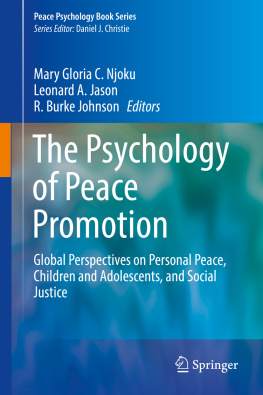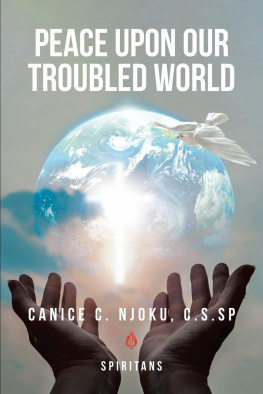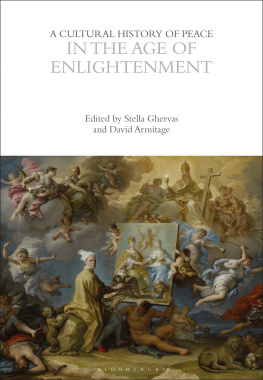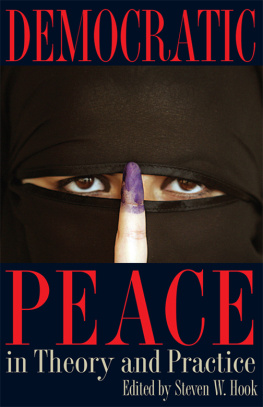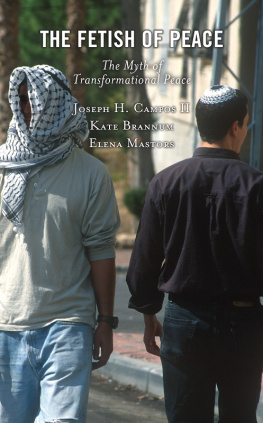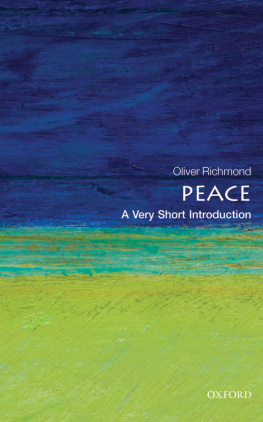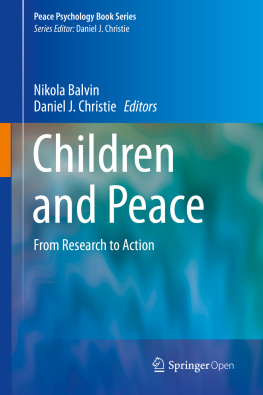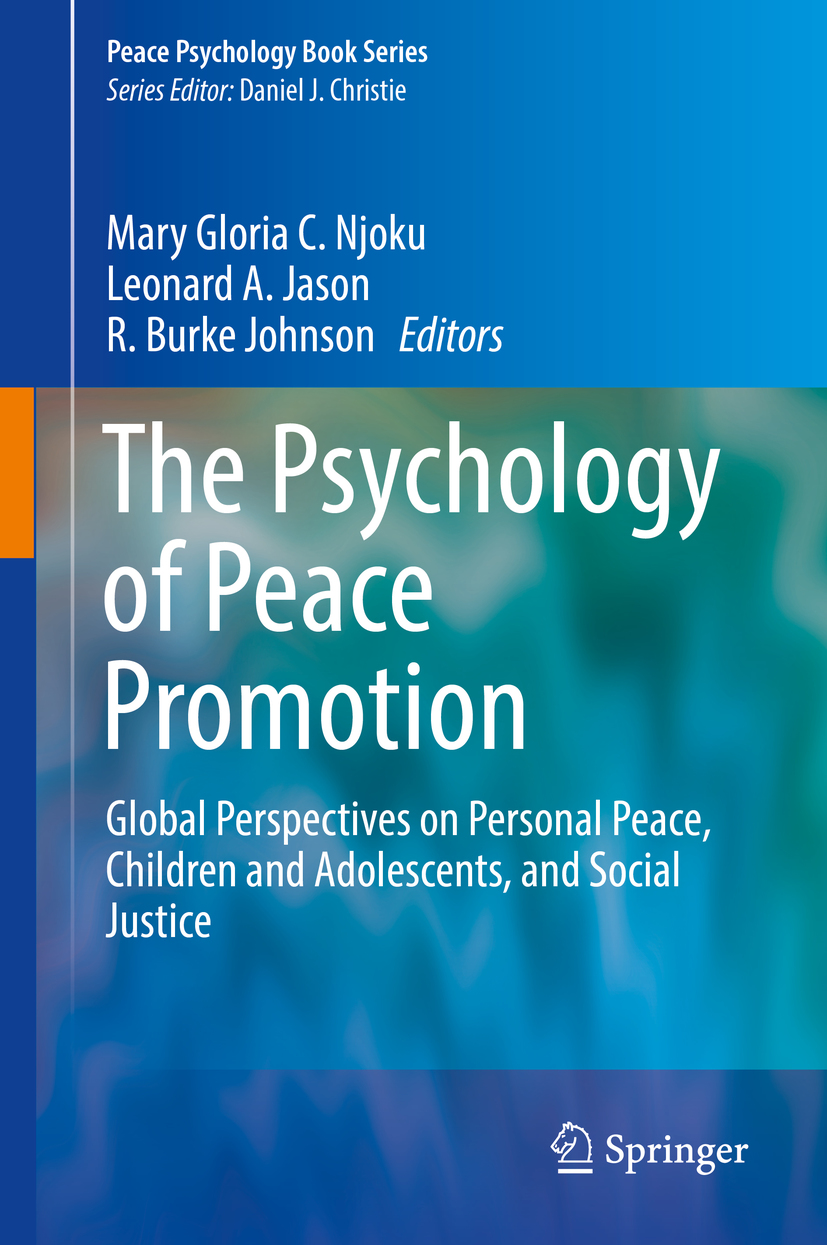Peace Psychology Book Series
Series Editor
Daniel J. Christie
Series Advisory Board
Herbert Blumberg , Goldsmiths College, United Kingdom
Daniel Bar-Tal , Tel Aviv University, Israel
Klaus Boehnke , International University Bremen, Germany
Peter Coleman , Columbia University, USA
Cheryl de la Rey , University of Cape Town, South Africa
Shelley McKeown Jones , University of Bristol, United Kingdom
Yayah Khisbiyah , Universitas Muhammadiyah Surakarta, Indonesia
Siew Fang Law , Victoria University, Australia
Wilson Lopez Lopez , Pontificia Universidad Javeriana, Colombia
Winnifred Louis , University of Queensland, Australia
Anthony Marsella , University of Hawaii, USA
Fathali Moghaddam , Georgetown University, USA
Maritza Montero , Central University of Venezuela, Venezuela
Cristina Montiel , Ateneo de Manila University, Philippines
Ann Sanson , University of Melbourne, Australia
Mohamed Seedat, University of South Africa
Michael Wessells , Columbia University and Randolph-Macon College, USA
More information about this series at http://www.springer.com/series/7298
Editors
Mary Gloria C. Njoku , Leonard A. Jason and R. Burke Johnson
The Psychology of Peace Promotion Global Perspectives on Personal Peace, Children and Adolescents, and Social Justice
Editors
Mary Gloria C. Njoku
Psychology, Godfrey Okoye University, Enugu, Nigeria
Leonard A. Jason
DePaul University, Chicago, IL, USA
R. Burke Johnson
Department of Professional Studies, University of South Alabama, Mobile, AL, USA
ISSN 2197-5779 e-ISSN 2197-5787
Peace Psychology Book Series
ISBN 978-3-030-14942-0 e-ISBN 978-3-030-14943-7
https://doi.org/10.1007/978-3-030-14943-7
Springer Nature Switzerland AG 2019
This work is subject to copyright. All rights are reserved by the Publisher, whether the whole or part of the material is concerned, specifically the rights of translation, reprinting, reuse of illustrations, recitation, broadcasting, reproduction on microfilms or in any other physical way, and transmission or information storage and retrieval, electronic adaptation, computer software, or by similar or dissimilar methodology now known or hereafter developed.
The use of general descriptive names, registered names, trademarks, service marks, etc. in this publication does not imply, even in the absence of a specific statement, that such names are exempt from the relevant protective laws and regulations and therefore free for general use.
The publisher, the authors, and the editors are safe to assume that the advice and information in this book are believed to be true and accurate at the date of publication. Neither the publisher nor the authors or the editors give a warranty, express or implied, with respect to the material contained herein or for any errors or omissions that may have been made. The publisher remains neutral with regard to jurisdictional claims in published maps and institutional affiliations.
This Springer imprint is published by the registered company Springer Nature Switzerland AG
The registered company address is: Gewerbestrasse 11, 6330 Cham, Switzerland
This book is dedicated to Sister Mary Gloria, who touched the lives of so many people. She was so wise, full of love, and selfless in her service as she committed her life to improving her community and helping others. Our lives are so much improved because of her generous work, which continues to be such an inspiration to others. We will miss her smile, wit, sense of humor, enthusiasm, and passion. She was truly a light and a force for goodness and peace.
Foreword
This profound volume, inspired by and dedicated to the late renowned peace educator, scholar, activist, and community psychologist Mary Gloria C. Njoku, is directed at the most important problem confronting our world, and constitutes a major benchmark in the history of the scholarship and the practice of peace promotion. There are no significant topics in the psychology of peace promotion that are left out of consideration, and the consideration given to topics is thorough, fresh, and creative. Innovative thinking is the norm here, and fresh ideas for positive change run throughout the chapters. The diversity, range, and ingenuity of topics are outstanding, and necessary to provide for new insights and possibilities in the processes of peace. Throughout the book connections are made to the field of community psychology (Jason, Glantsman, OBrien, & Ramian, 2019). Many authors have tried to make some connections of their work in peace studies and interventions to the overall community field, on the basis that these links are key to the successful promotion of peace.
The wide range of author backgrounds and orientations brings to the table the possibility of new and exciting consilience in the search for answers. The available relevant literature is well considered, and most importantly, as noted, new ideas for promoting peace arise at every turn. To begin the discussion of peace psychology and its real or potential contributions to achieving peace and reducing the horror (Farley, 1996) must now start with the thorough reading of this amazing volume! We can adopt or derive workable strategies from some of the main ideas herein, strategies that we can build on in the practice of peace in all its relevant facets. This volume should be required reading for all people working to achieve peace, well beyond the discipline of psychology. The history of peace promotion has been awaiting this book!
The contributors are impressive writers, thinkers, scholars, researchers, and activists, and the issues they look at are exhaustive, encompassing the personal facets of peacefulness; the essential need to promote peacefulness early in the lives of children; the cultural dimensions of peace; the central role of social justice concerns; the need to educate for peace; and the often unique features of research methodologies required to advance our understanding in this complex topic with its existential implications for society and life. No features of the evolving field of peace promotion are left untouched. As a former President of the American Psychological Association and the Society for the Study of Peace, Conflict and Violence, and Fellow of the Society for Community Research and Action, I can attest that the field of peace promotion now takes a leap forward upon the arrival of this landmark work.
References
Farley, F. (1996). From the heart. 102nd Annual Convention of the American Psychological Association: Presidential address (1994, Los Angeles, California). American Psychologist, 51 (8), 772776.
Jason, L. A., Glantsman, O., OBrien, J., & Ramian, K. N. (2019). Introduction to the field of community psychology: Becoming an agent of change. In L. A. Jason, O. Rabin-Belyaev, J. OBrien, & K. Ramian (Eds.).

